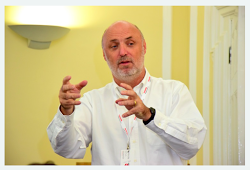A beginner’s guide to Doctor Gary Jones
Best known for:
Jones is an advocate of evidence-based educational leadership and management. His blog, Evidence Based Educational Leadership, explores how educators can use research more in their practice, and the pedagogical implications in doing so.
In 2016 he published an online handbook for teachers and school leaders on the best uses of evidence-based practice. Over the last two years he has also spoken at a range of conferences including ResearchED London, Sydney, Cambridge, New York, Glasgow and Goteborg.
Quick biography:
Where dos he work?
Jones is currently an associate of the Expansive Education Network based at the University of Winchester, where he supports teachers in engaging in evidence-based practice. He was previously Deputy Principle at Highlands College in Jersey. He earned his PhD in educational management from the University of Bristol.
What's it all about:
What does he research?
What he says:
Given the principles of evidence-based practice, even if we rely on the experience of a colleague, this limited-quality evidence can still lead to a better decision than not using it, as long as we are aware of its limitations when we act on it.
What others say:
Though Jones's profile is not as big as some other education experts, he has a solid reputation in educational research and has been involved in a number of projects. In the past he worked on e-learning, and has worked with Manchester Metropolitan University and the East Sussex Learning and Skills Council. In 2000, Jones was awarded the National Information and Learning Technology Association (NILTA) National ICT Leadership Award for his work in using ICT to promote pupil learning at Highlands College.
Why you should consider reading more:
With the increasing use of evidence-based evaluation in education and of educators, Jones's critique of the types and uses of evidence can help teachers and school leaders better consider the implications of evidence evaluation, and how to best utilise – but also question – education based evidence.
Top reads:
Further information:
Blog: Evidence Based Educational Leadership
Twitter: @DrGaryJones
Related Posts
Comments
By accepting you will be accessing a service provided by a third-party external to https://edcentral.uk/


